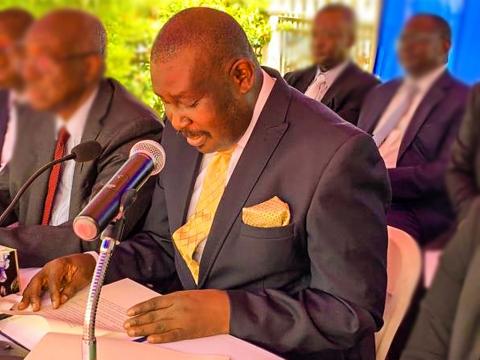By Francis H. Murray
The Chief Justice of Sierra Leone, Justice Desmond Babatunde Edwards, has warned staff and other officials of the Judiciary to desist from corruption and its related offences or face prosecution.
Justice Edwards was speaking on Tuesday, 10th November, at the Law Courts Building in Freetown, marking the official commencement of one week training for court registrars, bailiffs, administrative and other support staff of the judiciary.
He noted that the issue of corruption within the judiciary will not only impede access to justice, but will also stand against the principle of free, fair and expeditious trial, which he said will further undermine sustainable reforms and growth of the judiciary.
He went on to note that some staff members of the judiciary were either just too wicked or not good at their work, which he said resulted in them mostly reneging on their ‘sacred’ duties to allow files to get missing and accused persons to jump bail or sometimes surreptitiously stall some cases from coming up for hearing.
Justice Edwards further noted that the training is meant to address some of those issues that have been affecting fair judicial system as it will capacitate and equip staff members who have reneged on their duties under the guise of inexperience or lack of adequate training. He emphasised that after the training, there will be no hiding place for such people in the judiciary.
“You either do what is expected of you or face disciplinary action,” he warned.
The training, which is the first to be organized by the institution, is funded by the judiciary and the government of Sierra Leone and caters for one hundred and twenty-eight (128) staff members.
While he explained the adverse effects of corruption, Justice Edwards vowed to have a new judiciary that is transparent and accountable to the people. He assured the trainees that the judiciary and Legal Training Institute had identified seasoned facilitators with huge span of knowledge on all the courses, ranging from the roles of registrars in civil and criminal courts, to the roles of bailiffs and court secretaries in both Civil and Criminal proceedings.
The Chief Justice inspired the trainees to invest their best as the training will also empower those who are weak to be resourceful and productive.
The training will also cover treatment of vulnerable and special witnesses, bail and bond regulations, bail/bond requirements, management of records, and judiciary as an arm of government.
The lead facilitator for the training is the Director of Judiciary and Legal Training Institute, Justice Eku Roberts, with support from Justices Brown Marke, Alusine Sesay, Reginald Fynn and a host of others.
The trainees are expected to learn, among other things, the relationship with the Bar, Law Office, Sierra Leone Police and the Legal Aid Board, facilities and assets, ethics, with particular reference to the code of conduct for support staff, in order to develop their capacities for effective service delivery.
Copyright © 2020 Politico








